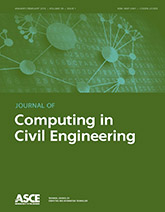Algorithms for Bayesian Network Modeling, Inference, and Reliability Assessment for Multistate Flow Networks

Tong, Y., and Tien, I., “Algorithms for Bayesian Network Modeling, Inference, and Reliability Assessment for Multistate Flow Networks,” ASCE Journal of Computing in Civil Engineering, Vol. 31, No. 5, September 2017
Abstract — The Bayesian network (BN) is a useful tool for the modeling and reliability assessment of civil infrastructure systems. For a system comprising many interconnected components, it captures the probabilistic dependencies between components and system performance, with inference in the BN informing decision making in the management of these systems. However, one of the major challenges in the BN modeling of infrastructure systems is the exponentially increasing computational complexity as the number of components in the system increases. Previously, algorithms have been developed for BN modeling of binary systems. Compared with binary systems, multistate system modeling provides a more detailed description of system reliability and enables the analysis of flow instead of connectivity networks. However, the dimensionality of the problem also increases. This paper advances the state of the art in BN modeling of complex networks by presenting new algorithms for constructing the BN model for multistate components and systems and performing exact inference over these models. The results support reliability assessment of civil infrastructure flow systems. Specifically, the authors present a new lossless compression algorithm for initial construction of the BN model and simultaneous preprocessing of intermediate factors for inference. These significantly reduce memory storage requirements for the BN. Two heuristics are described to further increase computational efficiency. The new algorithms are applied to an example infrastructure system. The ability to conduct inference across the network is demonstrated and performance measured compared to existing algorithms in terms of both memory storage and computation time. The proposed algorithms are shown to achieve exponentially increasing data compression with a stable increased computation time ratio, enabling larger multistate flow networks to be modeled as BNs than previously possible.
Leave a Reply